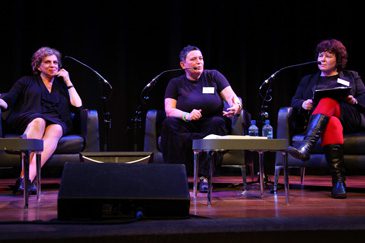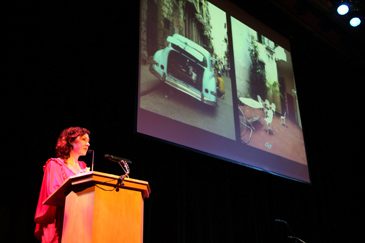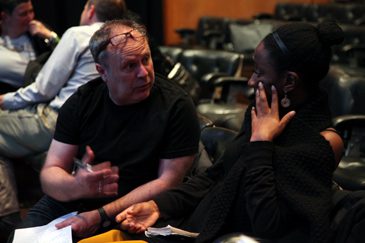Artists, scholars and critics were invited to present critical ideas on collaborative and participatory art, pedagogical experiments and how such art can be understood and discussed.
This two-day conference brought together international artists, curators and writers to discuss and debate the changing relationship between art and education.
Speakers were invited to present critical ideas on collective and participatory practice, pedagogical experiments and how such art can be understood and discussed.
Deschooling Society takes its title from Ivan Illich’s seminal 1971 book, one of the most influential radical critiques of the education system in Western countries. Issues at the heart of that critique have been increasingly debated within the art world in recent years, and the subject of education has attracted renewed attention from artists, curators, academics and collectives. Pedagogical models are currently being explored, re-imagined and deployed by practitioners from around the world in highly diverse projects, comprising laboratories, discursive platforms, temporary schools, participatory workshops and libraries. Simultaneously, progressive globalization has led to a revaluing of the collective knowledge and agency of local communities.
The conference was a collaborative event marking the start of a Hayward Gallery research project, culminating in the transformation of the gallery space into an alternative art school during summer 2012. It addressed the urgent issues that have arisen from the Centre for Possible Studies, part of an ongoing Serpentine Gallery project in the Edgware Road neighbourhood, and was the second part of the Serpentine’s collaboration with The Museum of Modern Art, New York, following the conference Transpedagogy: Contemporary Art and the Vehicles of Education at MoMA in May 2009.
Speakers included: Christopher Robbins (keynote), Martha Rosler (keynote), ARTSCHOOL/UK, Lars Bang Larsen, Dave Beech, Claire Bishop, Tania Bruguera, Marcelo Expósito, Harrell Fletcher, Jeanne Van Heeswijk, Pablo Helguera, Hannah Hurtzig, Suzanne Lacy, Carmen Moersch, Nils Norman, Hans Ulrich Obrist, Paul O’Neill, Marion von Osten, Irit Rogoff, Ralph Rugoff, Terry Smith, Lisa Tickner, Gediminas Urbonas, Mick Wilson.
29th–30th April 2010, 10am–6pm
Deschooling Society was jointly organised by Sally Tallant, Head of Programmes, Nicola Lees, Public Programmes Curator, Janna Graham, Education Project Curator from the Serpentine Gallery and Cliff Lauson, Curator and Rafal Niemojewski, Curator of Public Programmes, Hayward Gallery/Southbank Centre.
PROGRAMME
Day 1: Thursday 29th April
10:00–10:15: Greetings and Introduction by Ralph Rugoff and Sally Tallant
10:15–11:00: Keynote lecture by Christopher Robbins “Escape from Politics: The Challenge of Pedagogy and Democratic Politics in the De/schooled Society”
10:45–11:15: Response and Q&A moderated by Sally Tallant
Christopher Robbins contextualised historical pedagogic experiments. He commented on neo liberal influences on pedagogy and its hyper individualisation i.e. “I am empowered as a consumer”. He spoke about educational frameworks mirroring social relations, and as a consequence how we must engage with the political when speaking of education. For him, critical pedagogy implies mutuality. He made the case for education as democracy.
11:15–12:45: Panel discussion: “From Discursive Practices to the Pedagogical Turn”, with Carmen Moersch and Irit Rogoff, moderated by Sally Tallant.
Carmen Moersch discussed educational projects at Documenta 12, 2006. She mapped out the ways in which gallery education can be about the affirmation, reproduction, deconstruction or transformation of the institution.
Irit Rogoff took the viewpoint that education is an entry point into discussing knowledge. Through this process one discovers that knowledge does rather than is. For her, it is not about freeing knowledge but undoing the very possibility of containment.
12:45–14:00: Break
14:00–15:30: Dialogues: “Insertions, Alterations, and Rearrangements within Existing Institutional Frameworks”, with Harrell Fletcher and Nils Norman. Opening statement and moderation by Claire Bishop
Claire Bishop introduced the session and raised the question: why is contemporary art so interested in Art Education? She associated this apparent trend to increased interest in the social orientation of art, relational aesthetics and its institutionalisation, and the desire for more content within institutions. For her, there are parallels to be made between the historical upheavals in art and those in education. She talked about the autonomy of both art and education being at threat, and it is at this time that both fields find themselves as allies.
Harrell Fletcher discussed a number of his projects and how in every institution he tries to go beyond the obvious. He views each project as a form of research. He attempts to create structures in order to learn about the new environments that he finds himself in.
Nils Norman talked through an expanded diagram of his practice, he spoke about his artistic and teaching practice being interlinked and connected to the idea of The Expanded School. He was very critical of the Bologna process and how this has impacted forms of teaching in art schools. His main question was: how is it possible to work within this system? He speculated on how a hybrid school can exist that borrows from both the Bozar and Bologna models.
Clare Bishop posed the question: What is to be gained from working within an academic institution as an artist? Answers: Time, Money, Freedom and different set of relations
15:30–16:00: Break
16:00–17:00: Presentations: “Pedagogy of Place – Self-Organized Education”, featuring ARTSCHOOL/UK, London; Free University Warsaw (Janek Sowa);16 Beaver, New York (Pedro Lasch); The Public School, Brussels (Sonia Dermience); Experimental Drawing Class, London (Terry Smith), introduced by Rafal Niemojewski
Day 2: Friday 30th April
10:00–10:15: Greetings
10:15–10:30: Keynote lecture by Martha Rosler
10:45–11:15: Martha Rosler in conversation with Hans Ulrich Obrist
Martha Rosler spoke of education in terms of creativity versus discipline and order. She labelled education as the doctrine of the age, whose aim was to produce subjects and citizens. Education as such has become a means of elevating empowerment over simple literacy and numeracy. She cited individuals such as Richard Florida’s work on the rise of the creative class as the forbearer of this form of thinking.
In contemporary society museums are a form of mass culture, with this development the concept of advanced art has disappeared. Art no longer has a metaphysical or transcendental function, it is rather linked to consumption, fashion and celebrity – this is evidence of the conflation of art with the taste classes.
Martha posed the question: what can art teach? For her Art serves to illuminate practically everything we know about, what it can’t do in our times (notably in our museums) is deal with the political.
11:15–12:45: Panel discussion: Protest in Art School: Rituals of Power and Rebellion since the Sixties, with Dave Beech, Adrian Rifkin and Lisa Tickner, moderated by Cliff Lauson
Panel discussion: Protest in Art School: Cliff Lauson introduced the session by posing the questions: How do teachers and professors exercise their own micro politics in their teaching?
– Dave Beech spoke about the occupation of Portsmouth University, which he attributed to an impulse within the student cohort to take themselves militantly and seriously. Within his own work as a tutor Dave attempts to overturn the conventional roles of teacher-student via the technique of perplexity/ignorance.
– Lisa Tickner detailed Thierry de Duve’s conception of the varying models of art education. She outlined the difference between the academic model of talent-metier-imitation, the Modernist model of creativity-medium-invention, and the post modernist model of attitude-practice-deconstruction.
-Adrian Rifkin proposed that the political left must learn how to run backwards. Using the metaphor of the footballer running backwards whilst the game unfolds, he warned that a rethinking of deschooling must be done with a firm eye on the ball and the playing field. He emphasised that the realities on the current context must be prioritised over mythologies, and that perhaps progress was to be found in the affirmation of loss. He outlined how state education is producing ingrained complicity, and how the educational turn had penetrated all cultural realms from television to the museum. A result of this is that consumers/viewers are happy to play the role of the student. He was opposed to this set of relations and posited that the pedagogical turn should exist as a social encounter as opposed to the transmission of knowledge.
12:45–14:00: Break
14:00–15:30: Dialogues: “Theatres of Education”, with Hannah Hurtzig, Suzanne Lacy and Pablo Helguera
Pablo Helguera introduced the session by setting out the problematic of common language pedagogy versus education as performative practice.
Suzanne Lacy spoke about critical pedagogy framed with respect to the liberation of education as a site for struggle and as a tool for change making. She spoke of education in terms of embodiment and as set of relational encounters. For her, neo liberal environments are typified by a lack of spaces for exchange, as such her work aims to create these spaces and engage with communities. She spoke of the public gaze as a form of community witnessing and how in some contexts the political necessitated pedagogy. She posed the questions: what is curriculum? what does it look like outside the school?
Hannah Hurtzig spoke about here Mobile Academy project and how it endeavoured to infiltrate public space with narrative and knowledge transfer. She saw her Black market project as being based on an economy of excess, which plays with the dichotomy of expectation and disappointment.
15:30–16:00: Break
16:00–17:00: Presentations: “Pedagogy of Place – Local Models and Knowledges”, featuring Marcelo Expósito, Barcelona; Janna Graham, London; Jeanne van Heeswijk, Rotterdam; Pablo Helguera, New York; Gediminas Urbonas, Vilnus; introduced by Nicola Lees
Janna Graham introduced the session by posing the questions: Where are we when we think? What is the relationship between thought and action in place?
Pablo Helguera spoke about the School of Panamerican Unrest project, which he outlined was aimed at questioning what is it that we know that others outside don’t know? He spoke about the possibility of deschooling the art world, whereby it begins to search for something other than its own self-referentiality.
17:00–17:45: Summary by Paul O’Neill and Mick Wilson, plenary session, questions from the audience.
17:45–18:00: Closing statement by Ralph Rugoff
Paul O’Neill spoke of the curatorial as a form of knowledge production rather than staging. He sees education as a contested ground that has the potential for social reconstruction and preservation. Mick Wilson emphasised that since the 1960s there has been a systematic project of education within government policy. He suggested that the problematic of the educational turn was a question of form, wherein pedagogy has been unhooked from the specific programme of the political. He posited that political agency needed to be achieved within and without the state, and within and without the institution.
Podcasts from the conference appeared on the Hayward Gallery blog.











